
Previous in Permutation and Combination Next in Permutation and Combination
Question Number 59021 by mr W last updated on 03/May/19
![[Q58885 reposted] How many 4−digit numbers abcd exist which are divisible by 3 and satisfy a≤b≤c≤d?](Q59021.png)
$$\left[{Q}\mathrm{58885}\:{reposted}\right] \\ $$$${How}\:{many}\:\mathrm{4}−{digit}\:{numbers}\:{abcd}\:{exist} \\ $$$${which}\:{are}\:{divisible}\:{by}\:\mathrm{3}\:{and}\:{satisfy} \\ $$$${a}\leqslant{b}\leqslant{c}\leqslant{d}? \\ $$
Commented by tanmay last updated on 03/May/19

$${is}\:{there}\:{any}\:{co}−{relation}\:{between}\:{this}\:{problem} \\ $$$${and}\:{Euler}\:{enumeration}\:{partition}\:... \\ $$
Commented by mr W last updated on 03/May/19

$${It}'{s}\:{not}\:{as}\:{easy}\:{as}\:{I}\:{thought}.\:{Please} \\ $$$${give}\:{a}\:{try}. \\ $$
Commented by Kunal12588 last updated on 03/May/19
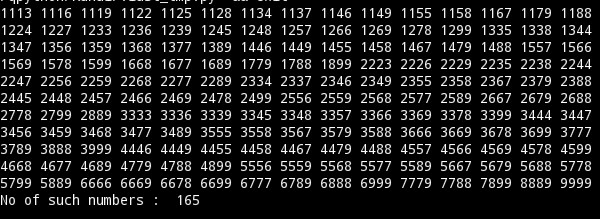
Commented by Kunal12588 last updated on 03/May/19
I think it may help someone who is trying to solve the problem.
Commented by mr W last updated on 03/May/19

$${thank}\:{you}\:{sir}! \\ $$$${can}\:{you}\:{give}\:{a}\:{formula}\:{how}\:{to}\:{calculate}\:{the} \\ $$$${number}\:{without}\:{knowing}\:{the}\:{numbers} \\ $$$${themselves}? \\ $$
Commented by mr W last updated on 03/May/19
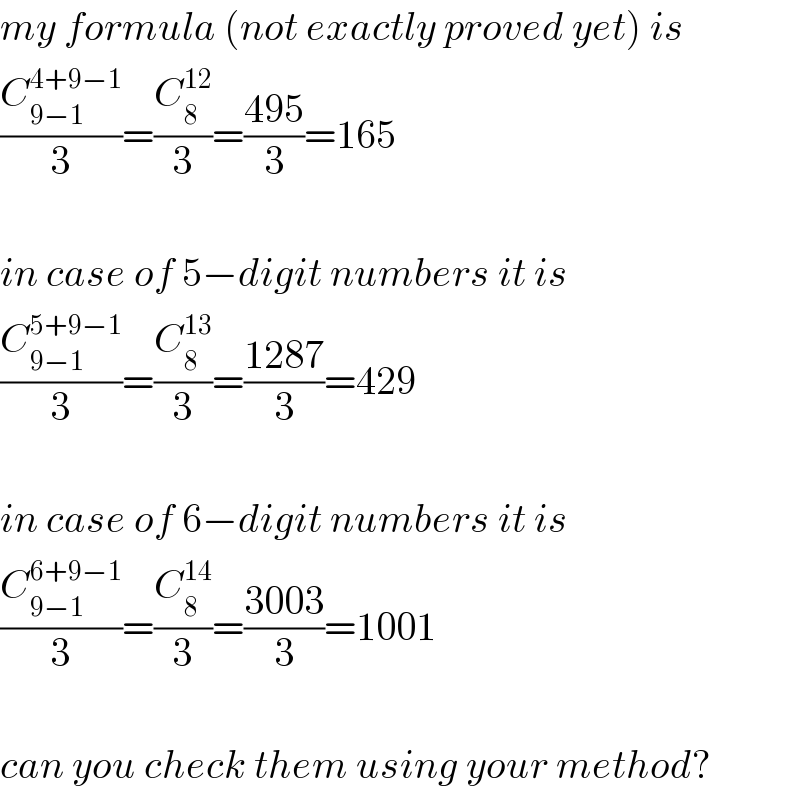
$${my}\:{formula}\:\left({not}\:{exactly}\:{proved}\:{yet}\right)\:{is} \\ $$$$\frac{{C}_{\mathrm{9}−\mathrm{1}} ^{\mathrm{4}+\mathrm{9}−\mathrm{1}} }{\mathrm{3}}=\frac{{C}_{\mathrm{8}} ^{\mathrm{12}} }{\mathrm{3}}=\frac{\mathrm{495}}{\mathrm{3}}=\mathrm{165} \\ $$$$ \\ $$$${in}\:{case}\:{of}\:\mathrm{5}−{digit}\:{numbers}\:{it}\:{is} \\ $$$$\frac{{C}_{\mathrm{9}−\mathrm{1}} ^{\mathrm{5}+\mathrm{9}−\mathrm{1}} }{\mathrm{3}}=\frac{{C}_{\mathrm{8}} ^{\mathrm{13}} }{\mathrm{3}}=\frac{\mathrm{1287}}{\mathrm{3}}=\mathrm{429} \\ $$$$ \\ $$$${in}\:{case}\:{of}\:\mathrm{6}−{digit}\:{numbers}\:{it}\:{is} \\ $$$$\frac{{C}_{\mathrm{9}−\mathrm{1}} ^{\mathrm{6}+\mathrm{9}−\mathrm{1}} }{\mathrm{3}}=\frac{{C}_{\mathrm{8}} ^{\mathrm{14}} }{\mathrm{3}}=\frac{\mathrm{3003}}{\mathrm{3}}=\mathrm{1001} \\ $$$$ \\ $$$${can}\:{you}\:{check}\:{them}\:{using}\:{your}\:{method}? \\ $$
Commented by mr W last updated on 03/May/19

$${ajfour}\:{sir},\:{MJS}\:{sir},\:{tanmay}\:{sir}: \\ $$$${can}\:{you}\:{please}\:{also}\:{have}\:{a}\:{look}\:{at}\:{this} \\ $$$${problem}? \\ $$
Commented by Kunal12588 last updated on 03/May/19
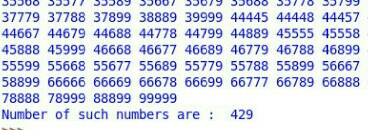
Commented by Kunal12588 last updated on 03/May/19

Commented by Kunal12588 last updated on 03/May/19
Sir MrW you are correct with 5-digit numbers There are 429 such numbers. but for 6-digit number they are total 1005.
Answered by Rasheed.Sindhi last updated on 03/May/19
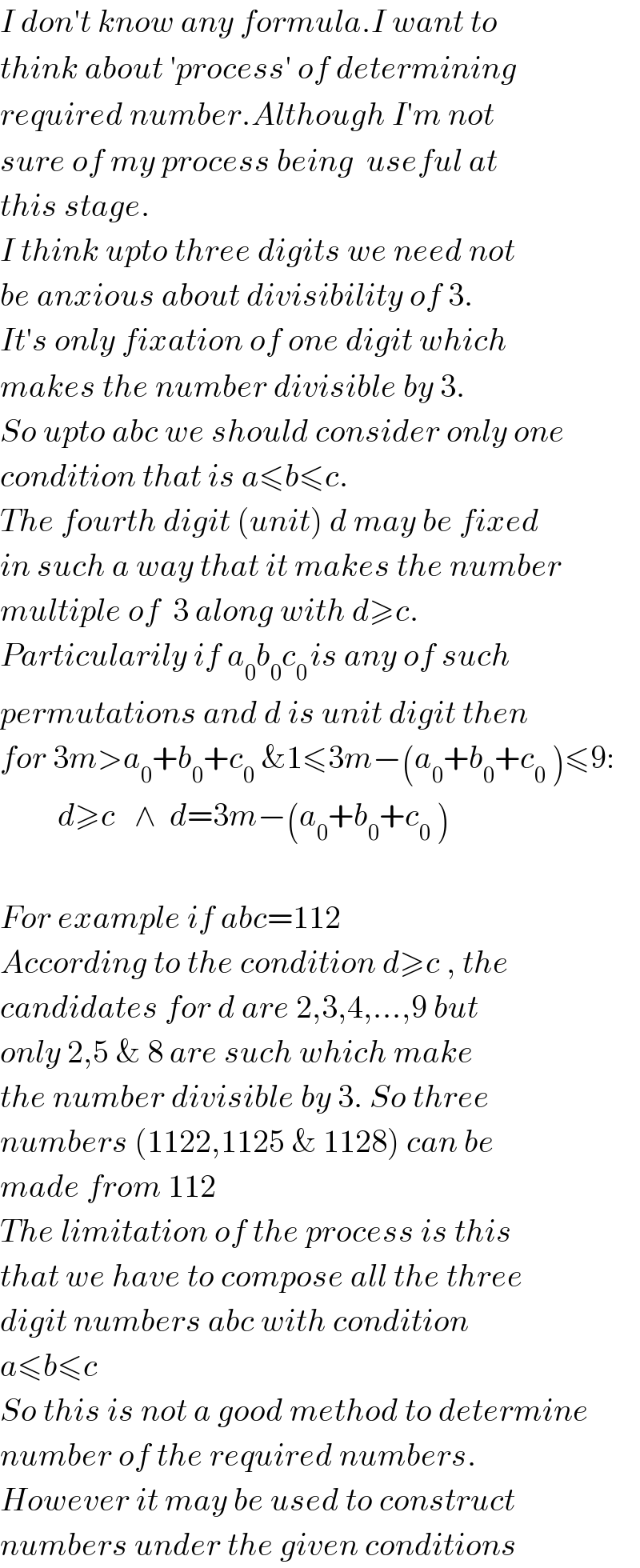
$${I}\:{don}'{t}\:{know}\:{any}\:{formula}.{I}\:{want}\:{to} \\ $$$${think}\:{about}\:'{process}'\:{of}\:{determining} \\ $$$${required}\:{number}.{Although}\:{I}'{m}\:{not} \\ $$$${sure}\:{of}\:{my}\:{process}\:{being}\:\:{useful}\:{at} \\ $$$${this}\:{stage}. \\ $$$${I}\:{think}\:{upto}\:{three}\:{digits}\:{we}\:{need}\:{not} \\ $$$${be}\:{anxious}\:{about}\:{divisibility}\:{of}\:\mathrm{3}. \\ $$$${It}'{s}\:{only}\:{fixation}\:{of}\:{one}\:{digit}\:{which} \\ $$$${makes}\:{the}\:{number}\:{divisible}\:{by}\:\mathrm{3}. \\ $$$${So}\:{upto}\:{abc}\:{we}\:{should}\:{consider}\:{only}\:{one} \\ $$$${condition}\:{that}\:{is}\:{a}\leqslant{b}\leqslant{c}. \\ $$$${The}\:{fourth}\:{digit}\:\left({unit}\right)\:{d}\:{may}\:{be}\:{fixed} \\ $$$${in}\:{such}\:{a}\:{way}\:{that}\:{it}\:{makes}\:{the}\:{number} \\ $$$${multiple}\:{of}\:\:\mathrm{3}\:{along}\:{with}\:{d}\geqslant{c}. \\ $$$${Particularily}\:{if}\:{a}_{\mathrm{0}} {b}_{\mathrm{0}} {c}_{\mathrm{0}\:} {is}\:{any}\:{of}\:{such} \\ $$$${permutations}\:{and}\:{d}\:{is}\:{unit}\:{digit}\:{then} \\ $$$${for}\:\mathrm{3}{m}>{a}_{\mathrm{0}} +{b}_{\mathrm{0}} +{c}_{\mathrm{0}} \:\&\mathrm{1}\leqslant\mathrm{3}{m}−\left({a}_{\mathrm{0}} +{b}_{\mathrm{0}} +{c}_{\mathrm{0}} \:\right)\leqslant\mathrm{9}: \\ $$$$\:\:\:\:\:\:\:\:\:{d}\geqslant{c}\:\:\:\wedge\:\:{d}=\mathrm{3}{m}−\left({a}_{\mathrm{0}} +{b}_{\mathrm{0}} +{c}_{\mathrm{0}} \:\right) \\ $$$$ \\ $$$${For}\:{example}\:{if}\:{abc}=\mathrm{112} \\ $$$${According}\:{to}\:{the}\:{condition}\:{d}\geqslant{c}\:,\:{the} \\ $$$${candidates}\:{for}\:{d}\:{are}\:\mathrm{2},\mathrm{3},\mathrm{4},...,\mathrm{9}\:{but} \\ $$$${only}\:\mathrm{2},\mathrm{5}\:\&\:\mathrm{8}\:{are}\:{such}\:{which}\:{make} \\ $$$${the}\:{number}\:{divisible}\:{by}\:\mathrm{3}.\:{So}\:{three} \\ $$$${numbers}\:\left(\mathrm{1122},\mathrm{1125}\:\&\:\mathrm{1128}\right)\:{can}\:{be}\: \\ $$$${made}\:{from}\:\mathrm{112} \\ $$$${The}\:{limitation}\:{of}\:{the}\:{process}\:{is}\:{this} \\ $$$${that}\:{we}\:{have}\:{to}\:{compose}\:{all}\:{the}\:{three} \\ $$$${digit}\:{numbers}\:{abc}\:{with}\:{condition} \\ $$$${a}\leqslant{b}\leqslant{c}\: \\ $$$${So}\:{this}\:{is}\:{not}\:{a}\:{good}\:{method}\:{to}\:{determine} \\ $$$${number}\:{of}\:{the}\:{required}\:{numbers}. \\ $$$${However}\:{it}\:{may}\:{be}\:{used}\:{to}\:{construct} \\ $$$${numbers}\:{under}\:{the}\:{given}\:{conditions} \\ $$
Answered by Rasheed.Sindhi last updated on 04/May/19
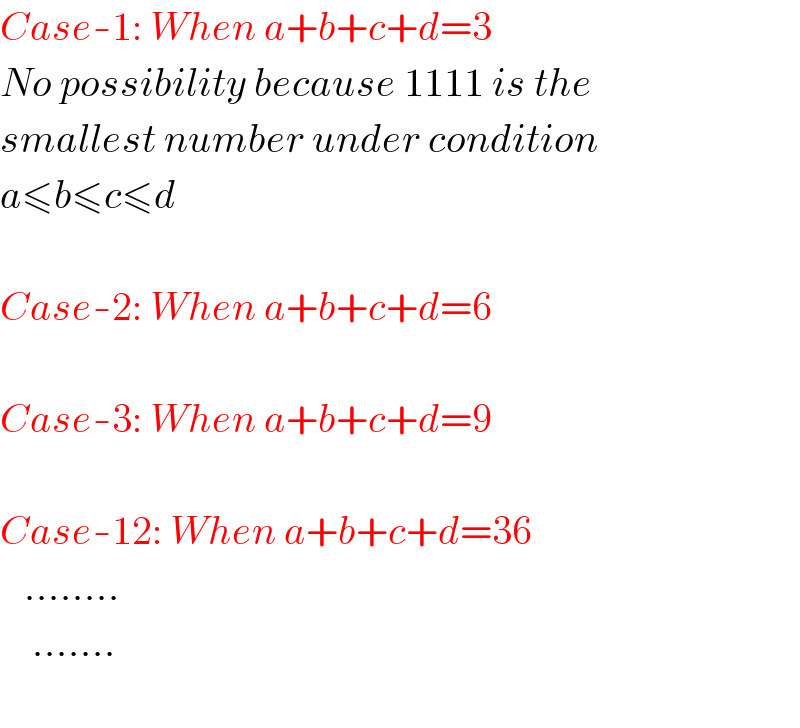
$${Case}-\mathrm{1}:\:{When}\:{a}+{b}+{c}+{d}=\mathrm{3} \\ $$$${No}\:{possibility}\:{because}\:\mathrm{1111}\:{is}\:{the} \\ $$$${smallest}\:{number}\:{under}\:{condition} \\ $$$${a}\leqslant{b}\leqslant{c}\leqslant{d} \\ $$$$ \\ $$$${Case}-\mathrm{2}:\:{When}\:{a}+{b}+{c}+{d}=\mathrm{6} \\ $$$$ \\ $$$${Case}-\mathrm{3}:\:{When}\:{a}+{b}+{c}+{d}=\mathrm{9} \\ $$$$ \\ $$$${Case}-\mathrm{12}:\:{When}\:{a}+{b}+{c}+{d}=\mathrm{36} \\ $$$$\:\:\:........ \\ $$$$\:\:\:\:....... \\ $$$$ \\ $$
Commented by mr W last updated on 03/May/19

$${thank}\:{you}\:{Rasheed}\:{sir}\:{for}\:{sharing} \\ $$$${your}\:{thoughts}! \\ $$
Commented by mr W last updated on 03/May/19
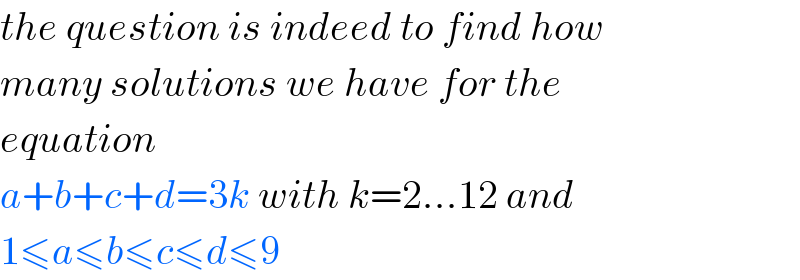
$${the}\:{question}\:{is}\:{indeed}\:{to}\:{find}\:{how} \\ $$$${many}\:{solutions}\:{we}\:{have}\:{for}\:{the} \\ $$$${equation} \\ $$$${a}+{b}+{c}+{d}=\mathrm{3}{k}\:{with}\:{k}=\mathrm{2}...\mathrm{12}\:{and} \\ $$$$\mathrm{1}\leqslant{a}\leqslant{b}\leqslant{c}\leqslant{d}\leqslant\mathrm{9} \\ $$
Commented by Rasheed.Sindhi last updated on 03/May/19
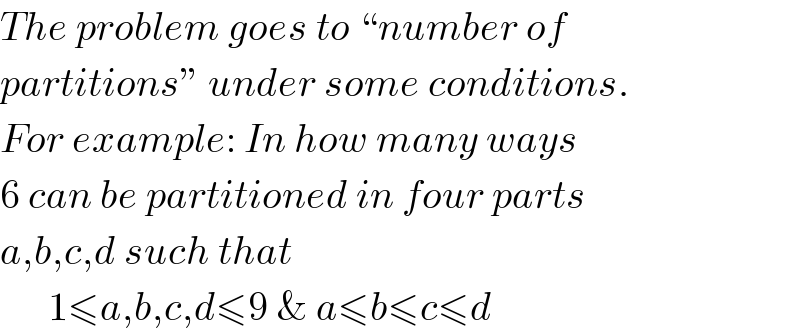
$${The}\:{problem}\:{goes}\:{to}\:``{number}\:{of} \\ $$$${partitions}''\:{under}\:{some}\:{conditions}. \\ $$$${For}\:{example}:\:{In}\:{how}\:{many}\:{ways} \\ $$$$\mathrm{6}\:{can}\:{be}\:{partitioned}\:{in}\:{four}\:{parts} \\ $$$${a},{b},{c},{d}\:{such}\:{that} \\ $$$$\:\:\:\:\:\:\mathrm{1}\leqslant{a},{b},{c},{d}\leqslant\mathrm{9}\:\&\:{a}\leqslant{b}\leqslant{c}\leqslant{d} \\ $$
Commented by Rasheed.Sindhi last updated on 04/May/19
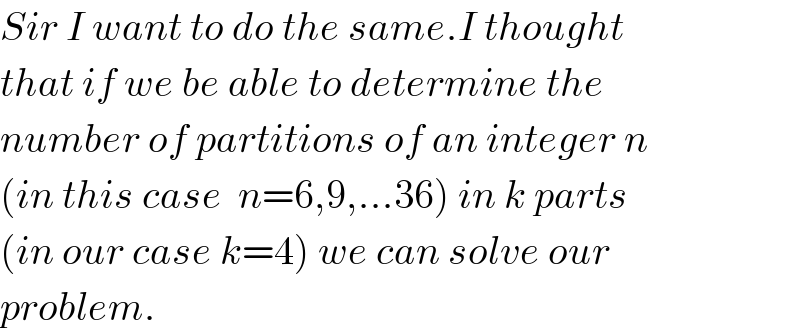
$${Sir}\:{I}\:{want}\:{to}\:{do}\:{the}\:{same}.{I}\:{thought} \\ $$$${that}\:{if}\:{we}\:{be}\:{able}\:{to}\:{determine}\:{the} \\ $$$${number}\:{of}\:{partitions}\:{of}\:{an}\:{integer}\:{n} \\ $$$$\left({in}\:{this}\:{case}\:\:{n}=\mathrm{6},\mathrm{9},...\mathrm{36}\right)\:{in}\:{k}\:{parts} \\ $$$$\left({in}\:{our}\:{case}\:{k}=\mathrm{4}\right)\:{we}\:{can}\:{solve}\:{our} \\ $$$${problem}. \\ $$
